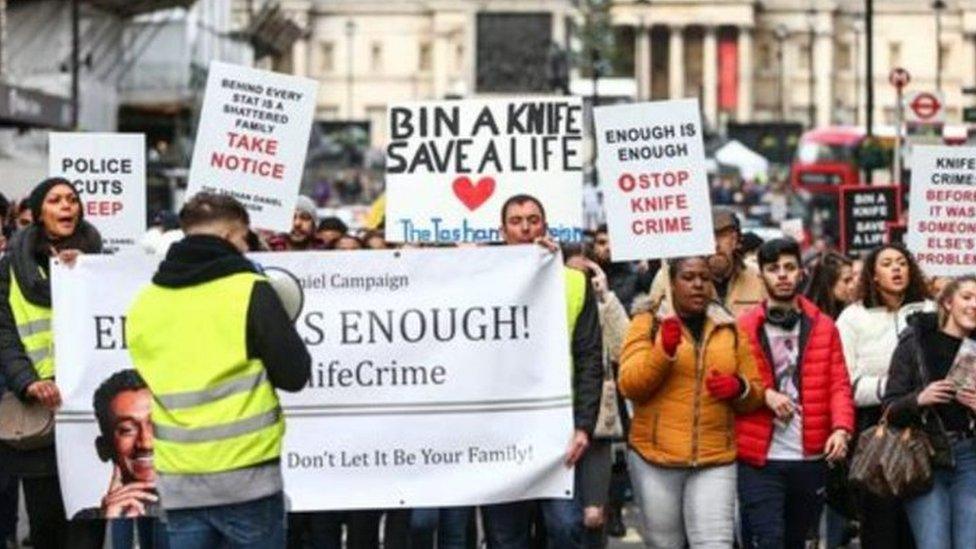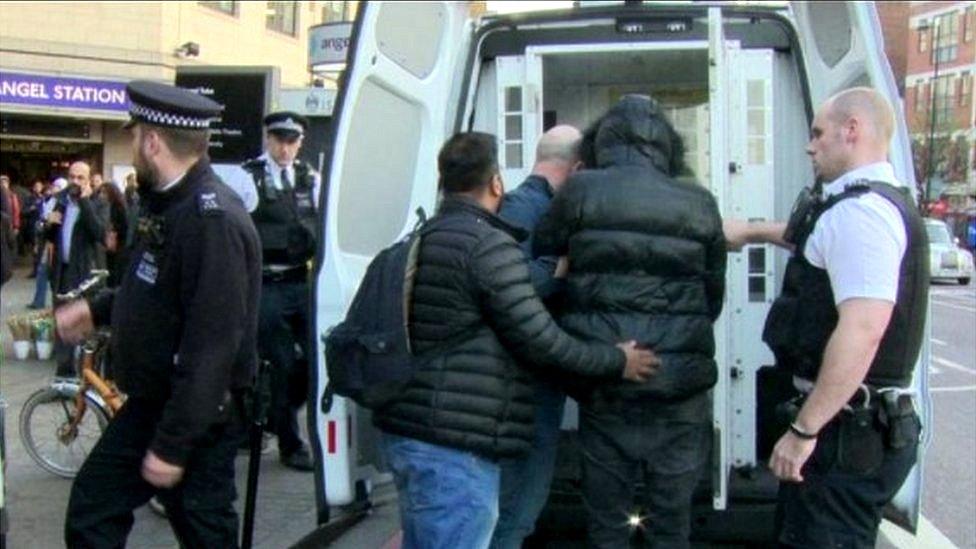'More frenzied' knife attacks behind some deaths, London Assembly told
- Published

Protests calling for action on knife crime have taken place
Fatal knife attacks on under 25s are becoming "more frenzied", the London Assembly has heard.
The director of London's Violence Reduction Unit (VRU), Lib Peck, said she was worried by a rise in under 25s being stabbed to death.
Ms Peck said hospital staff were telling her that attacks in this age group seemed to be getting more violent.
She also urged the police to stop sharing images of knives.
The problem was highlighted during a review of the VRU, which has seen £22.4m invested in tackling violent crime by treating it as a public health issue.

Ms Peck said she wanted the VRU to "get under the skin" of why the rise had happened
According to the Mayor's Office for Policing and Crime, the latest figures for London show a slight rise in youth homicide, from 30 murders in the year between June 2019 and May 2020, to 33 in 2020-21.
This comes amid a decrease in overall homicides, which fell by 17, from 144 to 127, over the same period.
The number of murders was "unacceptable", Ms Peck told City Hall's Police and Crime Committee.
Although "going in the right direction" overall, the rise in the number of killings of under 25s was "very worrying", she added.
"Lots of people have got different opinions on why that's the case and there's not any firm evidence," she said.
"The most compelling reason I've heard is that some of these murders have been more frenzied attacks - that's the intelligence I get from the hospitals - whereas before that might have been an isolated stabbing incident that didn't escalate into a homicide.
"That seems to have been a characteristic, very, very tragically, of some of the recent events."
'Desensitised'
Ms Peck said she wanted the VRU to "get under the skin" of why the rise had happened.
She called on the Met Police to stop using images of knives on its social media feeds, because young people were telling her they were influencing them to "tool up".
She said: "I was pleased to hear the Met's response, which was if they see research that gives them an indication of that negative impact they'd consider it.
"There's two pieces of research coming up in the next couple of months and I would hope the Met would then be persuaded to listen to that.
"I'm really keen to advocate on behalf of young people about the importance of not using knife imagery."
Donna Murray-Turner, a Croydon activist working with families bereaved by stabbings, agreed the police needed to move past showing the knives they had confiscated.
She said: "It's easy to become desensitised because we have had so many deaths.
"We know the police are out there taking knives off people and keeping us safe - that's not exceptional.
"We need a different way of looking at this to see what else we can be doing to combat this, and that involves listening to the communities involved."
Community activist Tyrell Davis-Douglin said he had seen people "upgrade" their knives after seeing what police have confiscated
Caroline Russell, a Green Party Assembly member, called for action on knife images.
She said: "We must listen to what young people are saying about this and it is shocking that the director has raised this with the Metropolitan Police Service some time ago and no action has yet been taken."
The Met Police said in a statement: "We are very aware of the ongoing debate around sharing images of weapons on social media. We carefully consider the release of all our information across all platforms, including images containing weapons.
"We do this to highlight the work of our officers and successful results to reassure communities that the Met is committed to targeting those carrying weapons and fuelling violence on the streets."
The statement added: "We always include wording which explicitly discourages weapon-carrying and violence to accompany any imagery."